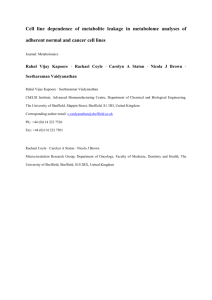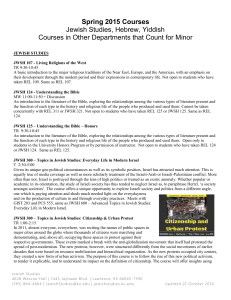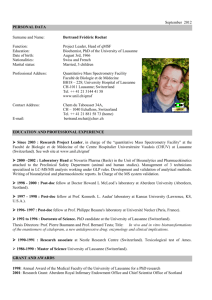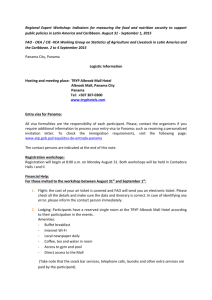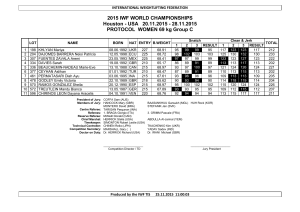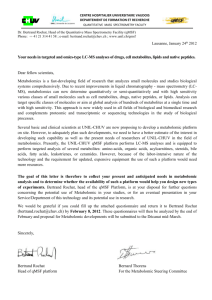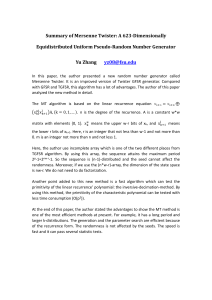The Semitic Tribes in Eastern Europe. The Origin of the Trypilla
advertisement
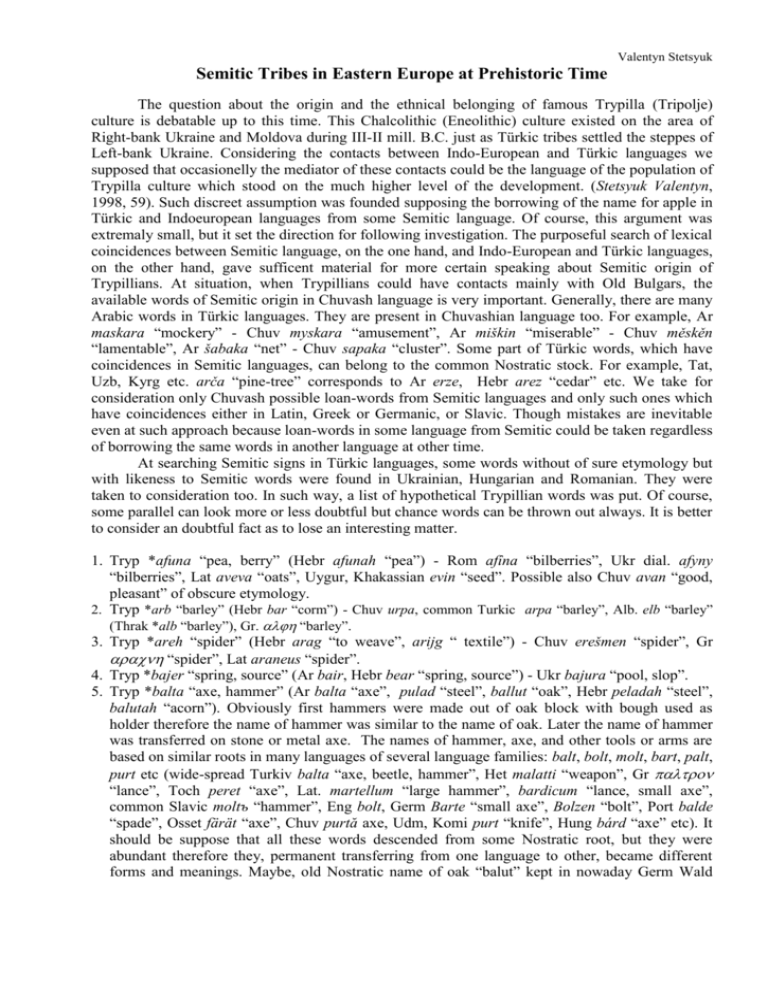
Valentyn Stetsyuk Semitic Tribes in Eastern Europe at Prehistoric Time The question about the origin and the ethnical belonging of famous Trypilla (Tripolje) culture is debatable up to this time. This Chalcolithic (Eneolithic) culture existed on the area of Right-bank Ukraine and Moldova during III-II mill. B.C. just as Türkic tribes settled the steppes of Left-bank Ukraine. Considering the contacts between Indo-European and Türkic languages we supposed that occasionelly the mediator of these contacts could be the language of the population of Trypilla culture which stood on the much higher level of the development. (Stetsyuk Valentyn, 1998, 59). Such discreet assumption was founded supposing the borrowing of the name for apple in Türkic and Indoeuropean languages from some Semitic language. Of course, this argument was extremaly small, but it set the direction for following investigation. The purposeful search of lexical coincidences between Semitic language, on the one hand, and Indo-European and Türkic languages, on the other hand, gave sufficent material for more certain speaking about Semitic origin of Trypillians. At situation, when Trypillians could have contacts mainly with Old Bulgars, the available words of Semitic origin in Chuvash language is very important. Generally, there are many Arabic words in Türkic languages. They are present in Chuvashian language too. For example, Ar maskara “mockery” - Chuv myskara “amusement”, Ar miškin “miserable” - Chuv měskěn “lamentable”, Ar šabaka “net” - Chuv sapaka “cluster”. Some part of Türkic words, which have coincidences in Semitic languages, can belong to the common Nostratic stock. For example, Tat, Uzb, Kyrg etc. arča “pine-tree” corresponds to Ar erze, Hebr arez “cedar” etc. We take for consideration only Chuvash possible loan-words from Semitic languages and only such ones which have coincidences either in Latin, Greek or Germanic, or Slavic. Though mistakes are inevitable even at such approach because loan-words in some language from Semitic could be taken regardless of borrowing the same words in another language at other time. At searching Semitic signs in Türkic languages, some words without of sure etymology but with likeness to Semitic words were found in Ukrainian, Hungarian and Romanian. They were taken to consideration too. In such way, a list of hypothetical Trypillian words was put. Of course, some parallel can look more or less doubtful but chance words can be thrown out always. It is better to consider an doubtful fact as to lose an interesting matter. 1. Tryp *afuna “pea, berry” (Hebr afunah “pea”) - Rom afîna “bilberries”, Ukr dial. afyny “bilberries”, Lat aveva “oats”, Uygur, Khakassian evin “seed”. Possible also Chuv avan “good, pleasant” of obscure etymology. 2. Tryp *arb “barley” (Hebr bar “corm”) - Chuv urpa, common Turkic arpa “barley”, Alb. elb “barley” (Thrak *alb “barley”), Gr. “barley”. 3. Tryp *areh “spider” (Hebr arag “to weave”, arijg “ textile”) - Chuv erešmen “spider”, Gr “spider”, Lat araneus “spider”. 4. Tryp *bajer “spring, source” (Ar bair, Hebr bear “spring, source”) - Ukr bajura “pool, slop”. 5. Tryp *balta “axe, hammer” (Ar balta “axe”, pulad “steel”, ballut “oak”, Hebr peladah “steel”, balutah “acorn”). Obviously first hammers were made out of oak block with bough used as holder therefore the name of hammer was similar to the name of oak. Later the name of hammer was transferred on stone or metal axe. The names of hammer, axe, and other tools or arms are based on similar roots in many languages of several language families: balt, bolt, molt, bart, palt, purt etc (wide-spread Turkiv balta “axe, beetle, hammer”, Het malatti “weapon”, Gr “lance”, Toch peret “axe”, Lat. martellum “large hammer”, bardicum “lance, small axe”, common Slavic moltъ “hammer”, Eng bolt, Germ Barte “small axe”, Bolzen “bolt”, Port balde “spade”, Osset färät “axe”, Chuv purtă axe, Udm, Komi purt “knife”, Hung bárd “axe” etc). It should be suppose that all these words descended from some Nostratic root, but they were abundant therefore they, permanent transferring from one language to other, became different forms and meanings. Maybe, old Nostratic name of oak “balut” kept in nowaday Germ Wald “forest”, Slavic bolto, Lombard palta, Alb baltё “swamp” (the sense “forest” and “swamp” are often confused). 6. Tryp *bean “child, fruit” (ивр. ben “son, child”) – Cuv (Dial/) pan “apple tree”, Lat pomum “fruit”, Eng bean, Ger Bohne. 7. Tryp *burg “cylinder, tower” (Ar burj’ “tower”, Hebr borag “pintle, dowel”) - Gr “tower”, Lat burgus “castle, tower”, Chuv purak “bast, bast-basket (cylindrical)”, Karach buruu “fence”, Germanic *burg (German Burg “castle”). 8. Tryp *fahar “white” (Hebr fahar “white clay”) - Hung feher “white”. 9. Tryp *farah “to fly” (Hebr farah “to fly”) - Chuv părakh “to throw”. 10.Tryp *gaba, gabal “great body” (Hebr gav “back”, Ar kafal “croupe”, j’amal “camel”, Phoen gebal “mountain”). - Wild horses inhabited the steppe of Ukraine at Herodotus’ time, but they were domesticated by Trypillians and Old Türks got horse together with the name from them (common Türkic jaby “horse”). Although Türks have other, the own name of horse at. The word jaby was borrowed by Old Greeks (Gr “horse”) and by Finno-Ugrians (Veps hebo, Fin hepo, Est. hobu, Hung lova “horse”). Trypillian root gaval also gave the name of horse which Indo-European were borrowed from Trypillians without of Türkic medation (Lat caballus “horse”, Gr “working horse”, Lit kumele “mare”, Sl kobyla “mare”, Pers kaval “swift-footed horse”). Evidently, Chuv haval “force” can be refered here. 11.Tryp *gavr “embers” (Ar j’amr, “embers”) - Chuv kăvar “embers”. 12. Tryp *habak “some kind of grass-plant” (Ar habak bot. “basil”) - Chuv hupah “burdock”. 13. Tryp. *haman “faithful, reliable” (Ar amin “faithful”) - Chuv haman “faithfulniss, solidity”. 14.Tryp *harta “piece of textile, patch” (Ar qartas “paper, letter”) - Chuv hărta “patch”. 15. Tryp *hason “to have profit” (Hebr hasen “to spare, economize”) - Chuv hušăn “to add, increase”, Hung haszon “profit”, Ukr khosen “use, profit”. 16. Tryp *hom “father-in-law” (Hebr ham “father-in-law”) - Chuv hun’ “father of son-(daughter)in-law”. 17. Tryp *hota “to seek in marriage” (Ar xatan, Hebr hoten “father-in-law”) - Chuv hăta “father of son-, daughter-in-law”. 18. Tryp *kad “pot, barrel” (Ar kadah “goblet”, Hebr kad “pot”) - Ukr kad’ and other similar Slavic words “barrel”, Gr “pitcher, jug, pail”, Alb kade “barrel”, Hung kád “barrel”. 19. Tryp *kart “village” (Ar qarjat “village”, Phoen kirjat, Hebr keret “town”) - Chuv karta “palisade”, Germanic *garda, gardon (Got gards “house”, Old Eng geard “yard”, German Garten “garden”). Similar words are present in Slavic, Celtic, Greek, Latin and in other IndoEuropean languages, but consonantism of these words contradicts to the rules of Indo-European languages, therefore one can think that this word has been borrowed from some other language. 20. Tryp *keser “carrot” (Ar j’azar, Hebr gazar “carrot”). This word was borrowed only by Western Türkic tribes which had more close contacts with Trypillians: Chuv, Tat kišer, Turkm kešer “carrot”. 21.Tryp *kors “scone, bread” (Ar kurs “scone”) - Ukr, Blr korž “scone”, Fin kyrsä “bread”, Veps kürz “fritter, cake”, maybe Afg kulča “pastry, cookie, biscuit”. The words of this root are widrlydistributed among various languages and have meanings “bread”, “corn”, “sheaf”, “millet”, “besom” etc: Arm xurdz, Kurd gurz, Osset kyris “sheaf”, Chuv kurăs “cluster of bast”, xuraç “food”, Komi korös’, Mansi kuras’ “besom”, Germ Hirse “millet”, Let garsa “gout-weed , Aegopodium podagraria ” (umbrella eatable plant), Rus (dialect) koros, korost “stack of flax sheafs”, Gr koros “satiation”, Let cers “bush”, Old Eng kors “очерет” (from Celtic). With the change r in l: Gr “round bread”, Hung köles “millet”, Let kulis “sheaf”, Slav kolsъ (Ukr, Rus kolos “ear”, Cz, Slov klas etc). Some names of gods can also be added here: Latin goddess of vegetation Ceres, East-Slavic god Khors. Maybe, Ukr koryst’ “use”, Osset xorz “good”, Rus khoroshy “good”, Germ Horst “bush-wood” are belonged to this root. 22. Tryp *lavh “board, plank” (Ar lavh “board”, Hebr luha “board, table”) - Slav lava, lavka “bench” (Ukr, Blr lavka, Pol ławka, Rus lava, Cz lava etc). Chuv lapka “shelf”, lav “cart”, (first carts were ordinary board on wheels). 23. Tryp *lis “thief” (Ar lis “thief”) - Slav lis, lisa “fox” (Ukr, Serb lys, Rus lisa, Pol lis, Sloven lis etc). The fox has by-name “thief” in Slavic folklore. 24. Tryp *marh “meadow” (Ar marh “meadow”) - Ukr morih “thick young grass”. 25. Tryp *masa “to feel by touch” (Ar massa “to feel by touch”, Hebr mašaš “to perceive by something”) - Chuv masa “exterior”, Ukr matsaty, Slovak macat “to feel by touch”. 26. Tryp *nar „light, fire, red” (Ar nur „light”) – Chuv. nar “ruddiness, roses”. 27.Tryp *parsa “beam” (Ar farsiya “board”, farsat “bed”) - Chuv părăs “beam”, Lat pertica “rod, perch”, Slovenian priska. 28. Tryp *pas “strip, strap” (Hebr fas “strip, strap”) - Chuv puša “whip, lash”, Pol, Ukr pas “belt, gidrle”. 29. Tryp *perut “skin, fell” (Hebr peruz “skin, fell”) - Chuv pětrě “skin sack”, Germanic *fodra “fur” (German Futter “fur”). 30. Tryp *rešet “net” (Hebr *rešet “net”) - Slav rešeto (Ukr, Rus, Bulg, Serb, Slov rešeto etc “sieve, riddle”). 31. Tryp *sak “sack” (Hebr šak “sack”) - Chuv sak “weir-basket, coop”, Lat saccus “sack”, Gr “sack”, Ukr, Rus sak “fishing-tackle in the form of sack” and other similar Slavic and Germanic words. 32. Tryp *sameh “glad, joyous” (Hebr sameha “glad, joyous”) - Chuv savăk “joy, gladness”. 33. Tryp *seret “strip, strap” (Ar šarit, Hebr seret “strip, strap”) – Chuv serete “plank”, Kurd sirat “way”, Rom, Ukr “Seret” (names of several rivers in Ukraine and Romania). 34.Tryp *šart “condition” (Ar. šart “condition”) – Chuv šǎrt “oath”. 35. Tryp *šep- “to strew” (Hebr šepone-li “to strew”) - Chuv sap “to strew”, Slavik sypati (Ukr sypaty, Rus sypat’ , Cz sypati etc). 36. Tryp *tahal “spleen” (Ar taal, Hebr tehol “spleen). - Chuv, Tat and other talak, Yak taal, Khak tölön, tileen, “spleen”. The oldest Türkic form is presented in Yakut language. 37. Tryp *taham “taste” (Hebr taham “taste”, Ar ta’am “taste”) - Chuv tehěm “taste”. 38. Tryp *tavar “thing, object of exchange” (Hebr toar “product, ware”, davar “word”, “thing”, “something”) - Chuv tăvar "salt", Ukr, Rus tovar “goods” and “cattle”, Arm tavar “sheep”, “flock”, Kum tuuar “flock”, Tur tavar “property”, “cattle”, Balk, Crim-Tat tu’ar “cattle” etc. The salt was the main export product for Old Bulgarians therefore it became sense “goods” (Stetsyuk Valentyn, 1998, 57). Many Iranian languages have the words tabar-teber-tevir “axe”, but Finno-Ugrian words of this root have sense “textile” (Saam tavjar, Mar tuvyr, Chant tegar). All these things are objects of barter and trade, that is to say goods. 39. Tryp *tiše “grass” (Hebr deše “grass, verdure, grass-plot”) - Chuv těšě “grain”, tes “color”, Mord tiše “grass, hay”, Eng thistle, German Distel “thistle”. 40. Tryp *tora: “unwritten law, customary” (Hebr torah “law”) – Chuv türe “judge”, Tat türä “law”, “judge”, Tur töre “customs” etc. 41. Tryp *vaita “cabin, house” (Ar bajt, Hebr bajt “house”) - Chuv vite “cow-house”, Lat *baita “cabin, house”. Restored Latin word is present in some nowaday Italian dialects (Meyer-Lübke, 1992, 70). 42. Tryp *verah “flower” (Ar firh „branch”, Hebr ferah “flower”) - Hung virág “flower”. 43. Tryp *vokor “bull” or “cow” (Ar bakara “cow”, Hebr bakar “cattle”) - Chuv văkăr, Tur öküz, Tat ögüz etc “bull”, Lat vacca “cow”. Ukr dial. (village of Moshanets, Chernivtsi district) vakar “herdsman of cattle” - out of Romanian. 44. Tryp *zivit “resin” (Hebr zefet “resin”, Ar zift, Syr zifta “resin”) - Arm jivt “resin”, Ukr zhyvyts’a and other similar Slavic words “galipot”, German Gift “poison”. Trypillian culture is closely connected with the culture of Cucuteni in Rumania. One can say about the origin of these cultures in Asia Minor. In such way, the creators of these both cultures had coming from Asia Minor could be Semites. I thank Mr. Koen-Thedek (Israel) for correcting my errors in the spelling of Hebrew words.

